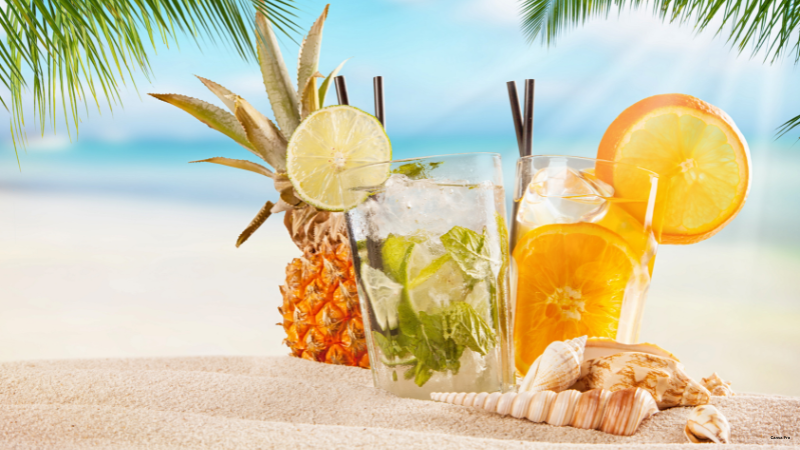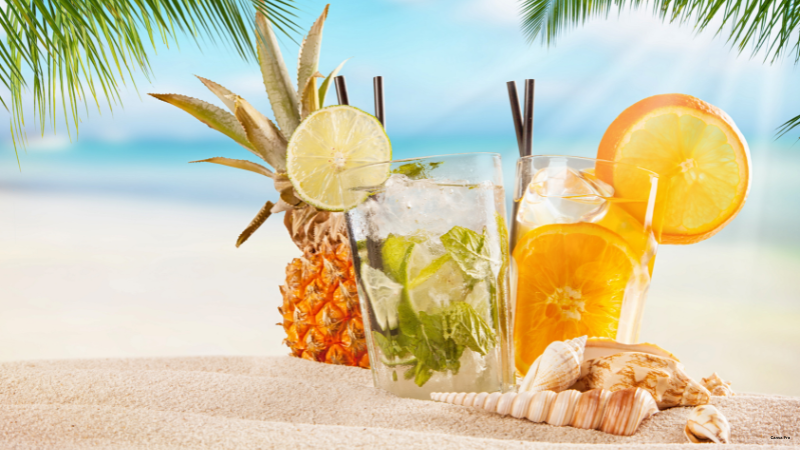Summer Food choices impact your heat tolerance. Discover what to eat, avoid, and how to stay hydrated during scorching temperatures for optimal health.
Summer Food choices mirror the season’s contrasting nature, just as summer brings opportunities for outdoor adventures – from mountain trails to beach volleyball, from cycling expeditions to leisurely park gatherings with friends. Yet it’s also the season when scorching temperatures can leave you drained, making even the simplest tasks feel overwhelming as you navigate through sweltering days in your lightest summer attire, or step into your car that feels like an oven after baking in the midday sun. These extreme temperatures don’t just affect your energy levels—they significantly impact your eating habits.
Your summer food choices—and even your desire to eat at all—are directly influenced by the daily temperature readings. With another heat wave approaching the eastern United States, understanding proper dietary choices and staying hydrated becomes crucial to prevent heat-related illness.
Research has shown that elevated temperatures naturally suppress appetite, as your body works to maintain thermal balance by reducing the heat produced during digestion. A significant study published in PLOS Biology in 2018 revealed that when temperatures rise, the hypothalamus produces specific heat-sensing proteins that trigger feelings of fullness, regardless of actual food intake. However, your nutritional requirements remain constant regardless of the weather. The challenge lies in maintaining regular meals while selecting appropriate foods—ones that help restore fluids, electrolytes, and essential nutrients that intense heat depletes. But what exactly constitutes the ideal hot-weather diet, and how can you incorporate these foods effectively while ensuring hydration safety?

Foods to avoid
Understanding what to eliminate from your diet during hot weather is as important as knowing what to include. Heavy, oil-rich foods should generally be avoided. While that outdoor barbecue or fried food feast might sound tempting, such high-fat, calorie-rich options can burden your digestive system, elevating body temperature and inducing lethargy. “The key is to consume lighter, more frequent meals to maintain energy levels while staying cool,” advises Lena Beal, a registered dietician nutritionist and Academy of Nutrition and Dietetics spokesperson.
You may also read: Zinc: Essential Functions and Dietary Sources
When it comes to snacking, certain choices can be problematic. “Highly processed, salty snacks like chips and preserved meats can intensify dehydration by elevating sodium levels, particularly if fluid intake is insufficient,” explains Martha McKittrick, a New York City-based registered dietician. This underscores why hydration is key during hot weather.
Two popular summer beverages—chilled beer and iced tea—might actually be counterproductive for your well-being. Both alcohol and caffeine function as diuretics, activating your urinary system and promoting water loss precisely when your body needs to retain it most. “Avoiding diuretic beverages is crucial since they ultimately contribute to increased dehydration levels,” explains Theresa Gentile, who serves as both a certified dietician nutritionist and spokesperson for the American Academy of Nutrition and Dietetics.
You may also read: Gut Microbiome: Your Key to Digestive Health and Well-being
Full-fat dairy products and beverages high in sugar content present their own set of challenges. Dairy products tend to decelerate the digestive process, causing your system to work harder and consequently raising your body temperature. Sugar, meanwhile, interferes with proper hydration levels.
“Excessive sugar consumption can exacerbate dehydration by drawing fluids into your digestive tract,” Gentile points out. “A better alternative would be flavored water. I also recommend creating homemade fruit popsicles.” These options can help in staying hydrated while avoiding unnecessary sugars.
Go-to foods
The list of recommended summer foods for hot weather significantly outnumbers those to avoid. Instead of heavy grilled meats, Gentile suggests opting for lighter, cold protein sources, including hard-boiled eggs, various seafood salads like tuna, salmon, and cold shrimp. Salads incorporating legumes can provide substantial protein while remaining easily digestible. However, remember that these foods require careful handling in hot conditions due to their perishable nature.
“High temperatures increase food safety risks,” Beal cautions. “Maintain cold foods below 40°F and avoid leaving perishable items exposed to high heat for more than an hour.” This is especially important when consuming foods outdoors, where direct sun exposure can quickly raise food temperatures to unsafe levels.
You may also read: Seafood For Heart Health and Environmental Sustainability
Your fluid intake deserves even more attention than your summer food choices. Heat rapidly depletes your body’s water reserves, requiring consistent replenishment. Start with eight to 12 eight-ounce cups of water daily. “As temperatures rise, so do hydration needs,” Beal emphasizes, “particularly with increased sweating. Don’t wait for thirst signals. Maintain regular fluid intake throughout the day.” Hydration helps prevent heat exhaustion and more severe conditions like heat stroke.
According to Gentile, one simple way to monitor your hydration status is by observing your urine color. A dark yellow hue indicates insufficient water intake. “Urine color charts can be a useful tool for assessing hydration levels,” she adds. “Aim for a pale yellow color, which indicates proper hydration.”
The heat doesn’t just deplete your water reserves; it also drains essential electrolytes. These electrolytes are vital minerals that become electrically charged when mixed with water. The list includes crucial elements like sodium, potassium chloride, calcium, magnesium, phosphate, and salt, among others. These minerals are fundamental in managing various bodily functions, from nerve and muscle operations to nutrient movement, blood coagulation, energy creation, and maintaining bone strength. While foods contain abundant electrolytes, summer conditions often demand faster replenishment than a regular meal can provide. In such cases, you can rely on sports drinks for electrolyte replacement, coconut water, or natural fruit drinks such as watermelon, orange, or tart cherry juice.
Fruits and vegetables serve as excellent sources for summer food both hydration and electrolytes. Most produce contains approximately 80% water content, with watermelon reaching 90% and cucumbers containing an impressive 97% water. McKittrick specifically recommends incorporating oranges, various berries, lettuce, celery, and tomatoes into your summer diet. These water-rich foods not only help with hydration but also provide essential nutrients. Beal adds that including herbs like mint or basil in fruit or vegetable salads can enhance flavor without additional salt or sugar. Another beneficial option is smoothies, which provide both hydration and electrolytes from fruit in a refreshing, cold format, without the heavy sugar and dairy content found in ice cream or milkshakes.
Regarding temperature regulation, some individuals find that spicy foods can actually help during hot weather by triggering perspiration, which ultimately provides a cooling effect. “In hot climates like the Middle East and Mexico, consuming spicy foods is a common practice,” Gentile notes. However, proper hydration is essential before consuming hot and spicy dishes. Without adequate water in your system, spicy foods may cause stomach discomfort. “I recommend moderate consumption of spicy foods,” Gentile advises, “and if you’re not accustomed to them, it’s best not to start during hot weather.”
Summer gatherings like picnics and barbecues remain integral to seasonal enjoyment. The good news is that you don’t have to choose between delicious, enjoyable foods and healthy, sensible options. By focusing on staying hydrated, choosing water-rich foods, and being mindful of electrolyte replacement, you can enjoy the summer while maintaining your health and reducing the risk of heat-related illness.
Source: Jeffrey Kluger (July 28, 2025). The Best—And Worst—Foods During a Heat Wave. Times. https://time.com/7305952/best-worst-foods-heat-wave/
#Best_summer_foods_for_extreme_heat, #What_to_eat_during_a_heat_wave, #Foods_that_help_stay_hydrated_in_summer, #Healthy_summer_diet_for_hot_weather, #Summer_foods_to_avoid_during_high_temperatures, #Electrolyte-rich_foods_for_hot_summer_days, #How_to_maintain_nutrition_during_summer_heat, #Refreshing_hydrating_fruits_for_summer, #Summer_food_safety_in_hot_weather, #Natural_ways_to_stay_cool_with_summer_foods, #Best_proteins_to_eat_during_hot_weather, #Avoiding_dehydration_with_summer_diet, #Water-rich_vegetables_for_summer_heat

